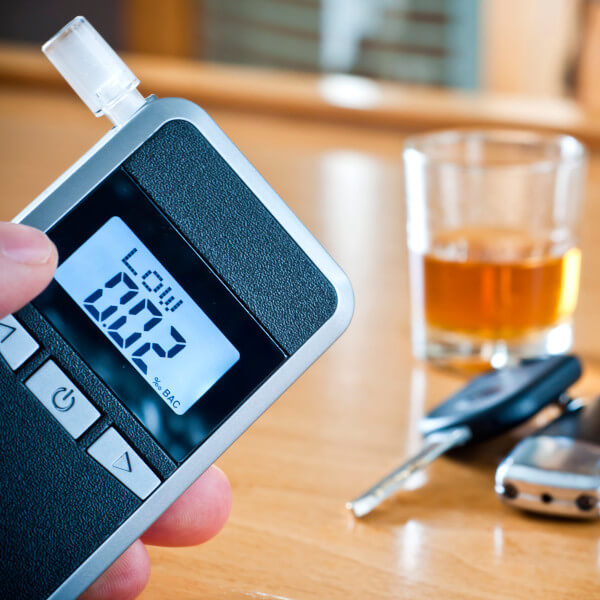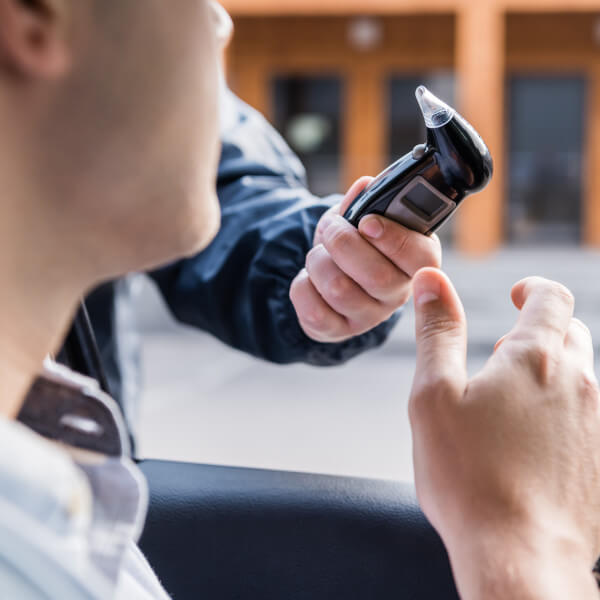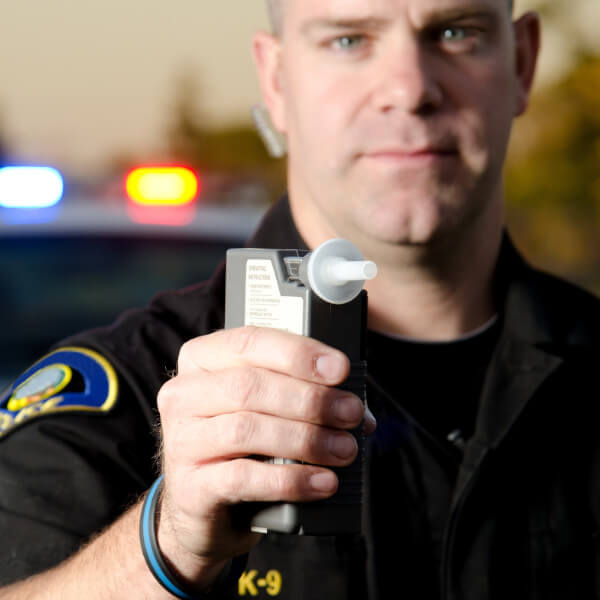What Is A Breathalyzer?
Breathalyzers are some of the most common breath alcohol testing devices in America today. While the name “breathalyzer” is used as a generic term, it was actually a brand name of one of the first commercially available breath alcohol testing devices. The “Breathalyzer” brand of alcohol breath-testing devices was developed and patented by Robert F. Borkenstein in 1954.
Other alcohol breath analyzers had been around since at least 1927 and were not a new invention. These devices continued to be improved upon, such as the Drunkometer in 1932, although these were not nearly as reliable as the breathalyzer would turn out to be. In the decades since it’s release, the breathalyzer has come to dominate the landscape of field-portable alcohol breath testing devices.
There are currently (as of late 2024) several active trademarks for the breathalyzer, although some of them have different spellings. A few of these include:
These are all different alcohol breath test devices, with the exception of the Breathalyzer Equalizer, which is supposedly a breath-freshening device.

How Does A Breathalyzer Work?
When alcohol is consumed the body immediately begins breaking it down to remove it safely from the body. This occurs through several different metabolic pathways, but the end result is that ethanol is excreted in sweat, urine, and breath. Breathalyzer devices measure the amount of ethanol in exhaled air, and by running calculations on the volume of ethanol in the breath, an overall blood alcohol concentration (BAC) can be determined.
This is possible because the relationship between breath and blood alcohol levels is fairly consistent between people, with a blood/breath ratio of 1:2,100 respectively. That being said, breathalyzers themselves have been criticized harshly due to the varying degree of accuracy between devices and the lack of routine calibration necessary to make these devices as accurate as possible.
Are Breathalyzers Accurate?

The accuracy of breathalyzers has been hotly debated for several decades now. The short answer is that no, breathalyzers are not accurate in many cases. This statement needs some articulation though, because many people misunderstand the role of breathalyzer tests and their purpose to law enforcement.
Field-portable breathalyzers are what is known as “preliminary breath test machines” and this is descriptive of their purpose. The “preliminary” means that these tests can indicate whether or not a more sensitive and accurate test is needed.
Breathalyzer tests are not intended to be the final say on someone’s blood alcohol concentration or their level of impairment even though law enforcement will often portray them as infallible. These types of DUI breath tests lack the level of accuracy needed to determine beyond a reasonable doubt that someone was, in fact, driving under the influence of alcohol. Faulty breathalyzers have been identified many times over the years due to lack of maintenance or police officers using them incorrectly.
Additionally, these devices require regular calibration at a laboratory, and failure to calibrate them and maintain records of these calibrations may lead them to be inadmissible as evidence. Most breathalyzer test results can be challenged and beaten in court by a competent and experienced attorney.
Call Now For A DUI Lawyer Near You
Call 1-888-839-4384 today to get connected with one of the top-rated DUI lawyers near you! Drunk Driving Defense has some of the most successful and highest-rated DUI attorneys in America on our roster.
DUI Breath Test Evidence
When a driver is suspected of DUI, an officer is given the statutory “option” of asking that you submit to a DUI breath test (most common type test), DUI blood test, urine test, or all three! The majority of states permit a person to REFUSE to submit to roadside testing. In most cases, the police officer will have asked you first to perform field sobriety tests, but these field evaluations ARE NOT mandatory.
In others, (e.g., California), the officer must ask for a DUI breath test but verbally advise you that the California breath test does not provide a sample for later independent testing by you or your legal counsel, so you can OPT for a blood test if you so desire. Others offer you the chance to be tested “the easy way”, by blowing into a portable breathalyzer machine.
If you try to resist, you can be PHYSICALLY wrestled to the ground, beaten, choked, or even strapped to a table or gurney so that blood can be drawn from your body or urine can be extracted through a catheter inserted in your penis or urethra. Yes, we are talking about a garden-variety, misdemeanor DUI case in the United States of America, without serious bodily injury or death. Yes, we are talking about these unbelievable acts being LEGALLY sanctioned by some of our more pathetic appellate courts across America.
Implied Consent Laws and Types of DUI Breath Tests Offered
DUI implied consent laws exist in every state in America, in one form or another. These laws enable police officers to ask (or DEMAND in some jurisdictions, such as Nevada and Michigan) that you submit to DUI breath testing or DUI blood testing is called “DUI implied consent” or “informed consent”. This idea developed from a legal fiction whereby the government agreed that if a person opted to drive on the state’s roadways, and thereby obtained the “benefit” of this public expenditure of money, then the person also IMPLIEDLY agreed to submit to giving a sample to the police so that analysis for alcohol (and drugs) can be performed.
In the last decade, some state governments began to actually add this printed language to driver’s license application forms required of its licensed drivers, effectively forcing you to agree in writing to give breath, blood, or urine at the request of a law enforcement officer who may suspect you of driving while impaired. In law school, we were taught that this is the classic “adhesion contract,” whereby one party (without any real bargaining position) was forced to sign an unfair agreement when no viable option—except to sign—exists.



Penalties For Refusing Breathalyzer or DUI Breath Tests
In the states where police legally cannot force a breath test or blood test from your body, the usual “penalty” for not taking a “chemical test” is most commonly loss of driver’s license (or loss of driving privileges in that state if your are licensed by another state at the time of your arrest). A few states have passed additional laws penalizing the driver who refuses to be tested with monetary penalties or other similar sanctions, but there are limits to what punishment can be exacted against a person who chooses NOT to incriminate himself/herself.
The length of a license suspension/revocation depends on state law and varies widely. Some states allow a “work” permit after a refusal; others do not. Check your state DUI laws by contacting one of our knowledgeable DUI lawyers now.
More Breathalyzer & DUI Breath Test Resources
If you’ve been arrested for a DUI due to a breathalyzer test or other DUI breath test, call 1-888-839-4384 today to speak with a top-rated DUI lawyer near you. Drunk Driving Defense has a network of experienced DUI lawyers all over America.
To learn more about the specifics of breathalyzers and DUI breath tests, take a look at some of our detailed articles on the subject below:
- DUI Breath Test Machines
- How Do I Blow Into a Breathalyzer?
- Can I Talk With My Attorney Before I Take a Breath Alcohol Test?
- How to Beat a DUI Breath Test
- Can Breathalyzer Results Be Challenged?
- Faulty Breath Machines and Missing Police Evidence
- Can I Get a DUI If I Refuse A Breathalyzer Test?
- DUI Breath Test Instruments (1995)
- Federal DUI Breath Test Devices Calibrating Regs (1997)
- Federal Conforming Alcohol Screening Devices (2001)
Find The Top-Rated DUI Lawyers Near You
We have listings for the top DUI lawyers in all 50 states and the District of Columbia. Find the best DUI lawyer for you by clicking on your state here.




